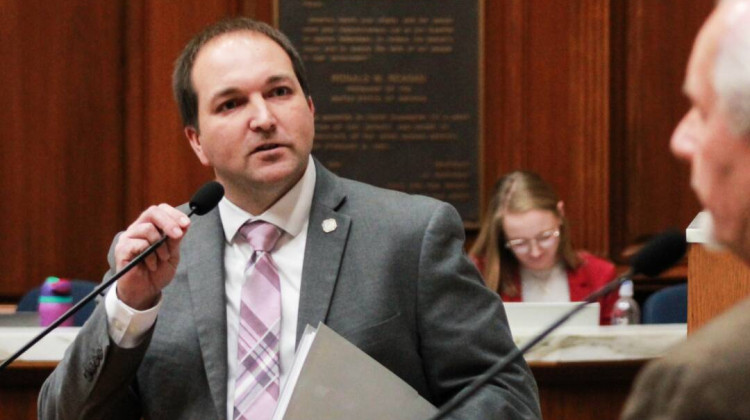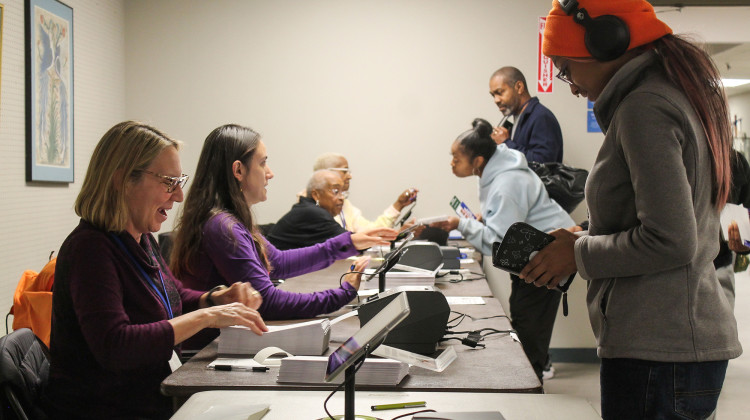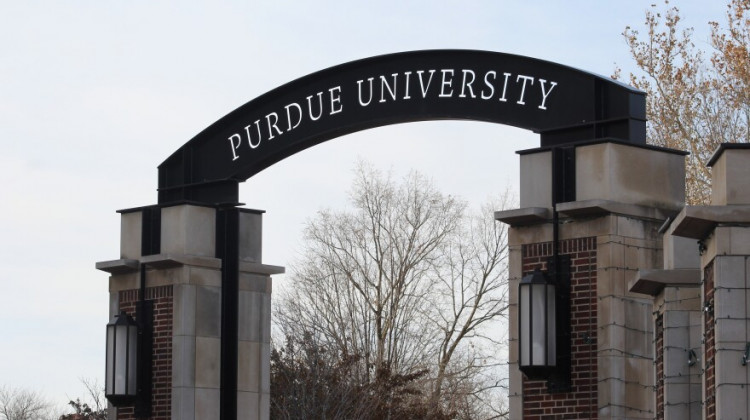
An amendment added to House Bill 1338 takes a strict-approach to the public access counselor’s role by requiring that they interpret the plain text of the laws.
FILE PHOTO: IPBA bill from Republican lawmakers that could lead to restrictions on how the state’s public access counselor does their job is on its way to the governor’s desk.
Sen. Aaron Freeman (R-Indianapolis) told lawmakers last week that he believes the position and recent interpretations of the laws have veered too liberal, which should change.
“We should be interpreting things according to what is written,” he said.
Freeman filed an amendment to House Bill 1338 last week that takes a strict approach to the public access counselor’s role by requiring that they interpret the plain text of the laws.
The bill has ties to contentious suburban politics in a Hamilton County library system. Freeman told WFYI he did not agree with some of the counselor’s recent opinions — one of those opinions is tethered to controversies at the library.
Luke Britt, the state’s longest-serving public access counselor, issued advisory opinions involving the Hamilton East Public Library system last year, including a meeting where two board members met their attorneys at a Fishers coffee shop.
Britt declined to comment on the legislation, but said Freeman did not meet with him or discuss his proposed changes to the office.
“All we're trying to do here is provide some direction, so that he has the ability to do his job without having to take major leaps and bounds on interpreting gaps in code.” Sen. Scott Baldwin (R-Noblesville), the bill’s sponsor in the Senate, said.
The House voted 58-36 Wednesday in favor of changes to House Bill 1338, which addresses disruptions of public meetings in addition to the public access counselor’s office.
The bill now goes to Gov. Eric Holcomb. If signed, some public access advocates fear it could lead to confusion and have a chilling effect on what the office does.
What does the public access counselor do?
The state’s public access counselor provides advice and assistance on public records laws. The counselor also writes advisory opinions that interpret these laws after members of the public or agencies file a complaint related to public records laws.
The Indiana General Assembly created the office in 1999.
Freeman said a “plain” interpretation of the law should not limit how Britt and future counselors issue advisory opinions. Baldwin agreed that it does not prevent the counselor from seeking mainstream resources to interpret words or their meanings.
“I’m sure he’ll find plenty to do,” Freeman said. “He’s a member of government and we all have plenty to do.”
But Britt’s role currently relies on the liberal interpretation of the law as it’s written in state laws.
“When confronted with a question of interpretation, the law should be liberally construed in favor of openness,” according to Indiana’s handbook of public access laws.
Gerry Lanosga, an associate professor of journalism at Indiana University, said the bill is asking the public access counselor not to do something that those laws explicitly tell him to do, which is that they be read liberally.
“We're all supposed to read those laws and interpret them broadly to implement the public policy of having the greatest amount of public access and information to the affairs of government,” Langosa said.
During the House’s discussion Wednesday, many Democrats spoke out against the bill.
Rep. Ed DeLaney (D-Indianapolis) said it’s a step back for public access.
“So we're going to fool around with the language of the law,” DeLaney said. “We're going to fool around with the tenure of this office and we're doing it all so that people will know less.”
Hamilton County library system woes
In an October opinion, Britt weighed in on whether HEPL board president Laura Alerding and board member Ray Maddalone broke the law when they met with hired attorneys from Barnes and Thornburg at a Fishers coffee shop.
Britt found they did violate the Open Door Law as they made up a committee and allegedly discussed its business, according to the opinion.
“It may not have been the primary purpose of the meeting, and indeed other matters may have been discussed, but it would be naive for this office to conclude — based on the evidence provided — that the officer slate was not discussed,” Britt wrote.
Alerding and Maddalone have since left the board along with two other members, including conservative pastor and lieutenant governor candidate Micah Beckwith.
Following a few unfavorable opinions by the public access office, the library’s board worked with Britt to go through training on complying with Open Door and public access laws, Siebe said.
“I credit Mr. Britt's assistance as a factor contributing to the Board's drastically improved public access record,” Craig Siebe, the library board’s president, wrote in an email to WFYI.
Siebe, who spoke on his own behalf, said that training was fruitful for the board that critics say struggled over the last year with transparency following its enactment of a controversial policy that removed books from young adult sections.
As another direct result of transparency concerns, board members voted in September to place limits on each other’s powers by not allowing an individual board member to exercise full authority without the board’s full consent.
The board flipped to conservative leadership in 2022. Those leaders sought to change the library’s collection development policy, which moved thousands of books deemed not “age appropriate” to the system’s general collection, mostly for adults. That policy targeted several books with LGBT+ themes.
The rule drew anger and celebration from many in Fishers and Noblesville. The book policy also catapulted to a national conversation after young adult author John Green publicly criticized its creation that resulted in his own book “The Fault in Our Stars” being placed in the general collection last summer.
That policy was paused and then eventually done away with last year. Since then board member seats have shifted yet again and they are searching for a new library director after longtime leader Edra Waterman left in November.
Green went on to discuss censorship in a wider lens, including in Indianapolis.
This is not the first time suburban controversies led to action by lawmakers. In 2022, Holcomb signed a law that requires public comment during school board meetings. The legislation came months after Carmel Clay Schools temporarily suspended public comment following disruptions at meetings.
Rachel Fradette is the WFYI Statehouse education reporter. Contact Rachel at rfradette@wfyi.org.
 DONATE
DONATE






 Support WFYI. We can't do it without you.
Support WFYI. We can't do it without you.